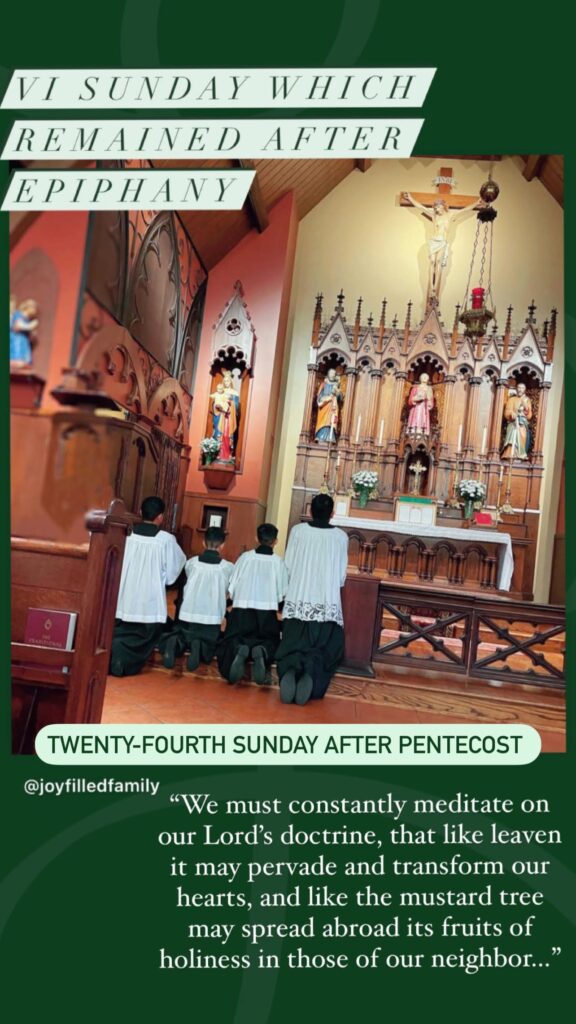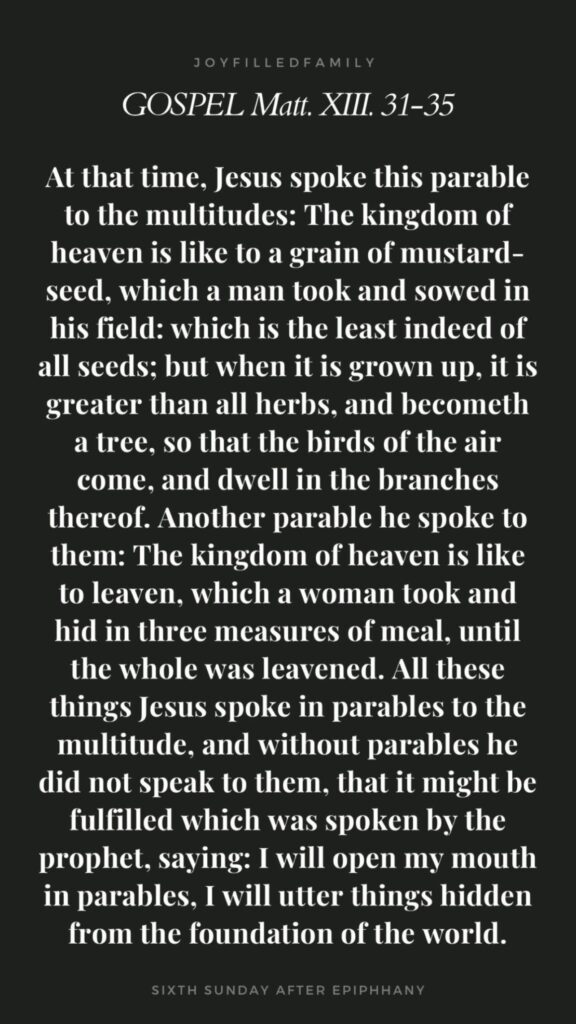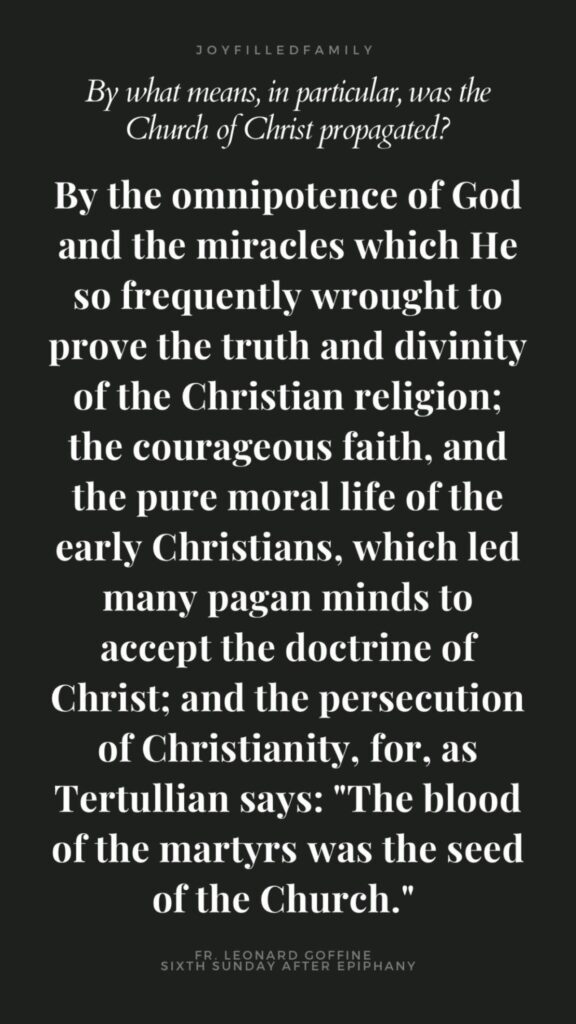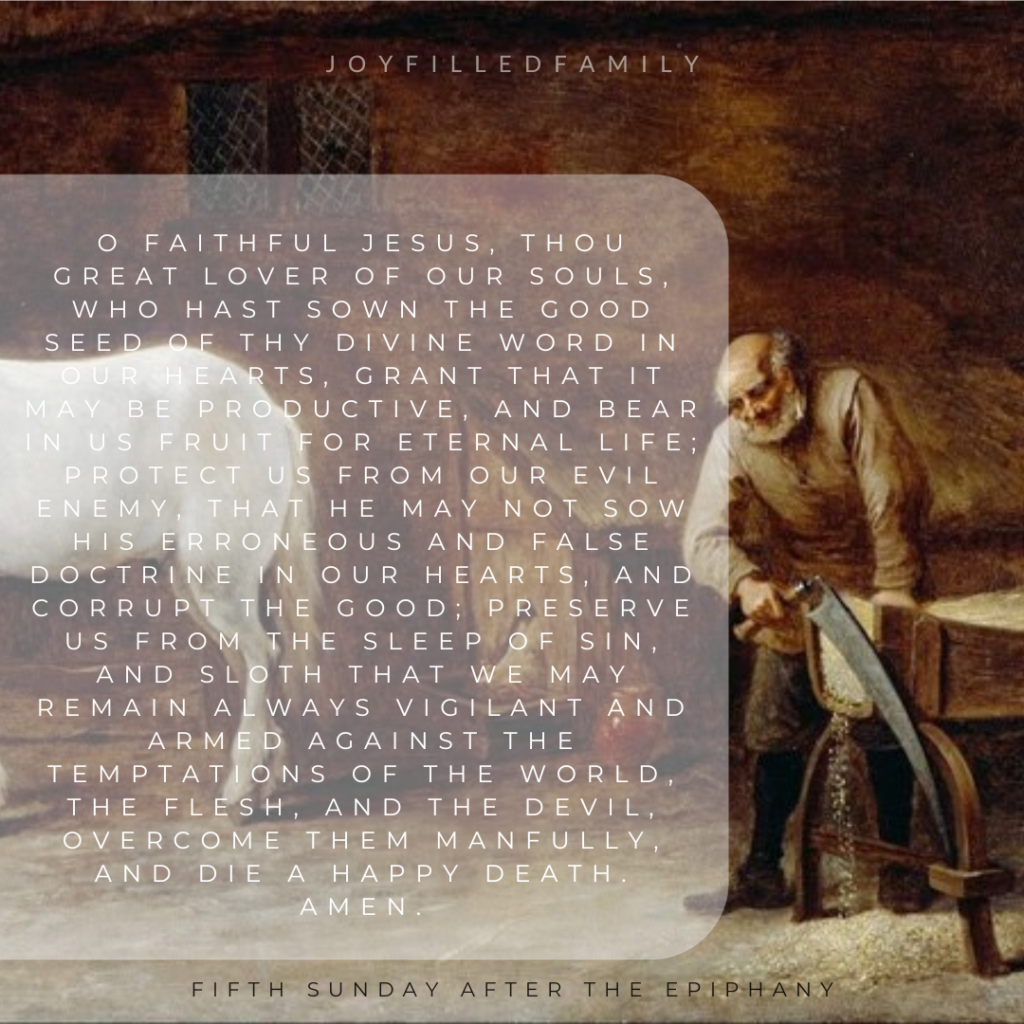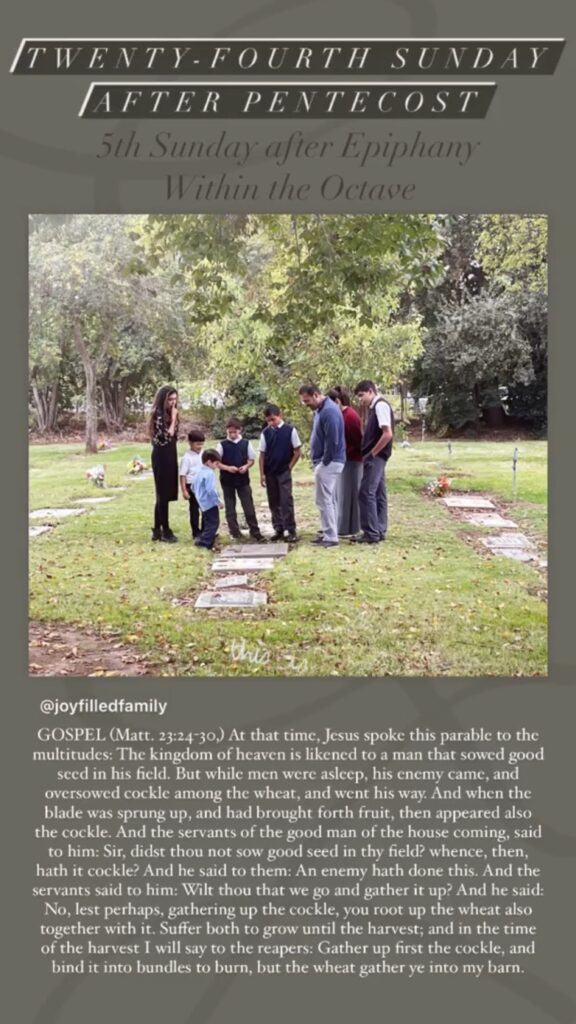Pictorial Lives of the Saints – Saint Nicholas of Bari
Saint Nicholas, the patron Saint of Russia, was born toward the end of the third century. His uncle, the Archbishop of Myra in Lycia, ordained him priest, and appointed him abbot of a monastery; and on the death of the archbishop he was elected to the vacant see. Throughout his life he retained the bright and guileless manners of his early years, and showed himself a special protector of the innocent and the wronged. Nicholas once heard that a person who had fallen into poverty intended to abandon his three daughters to a life of sin. Determined, if possible, to save their innocence, the Saint went out by night, and, taking with him, a bag of gold, flung it into the window of the sleeping father and hurried off. He, on awaking, deemed the gift a godsend, and with it dowered his eldest child. The Saint, overjoyed at his success, made like venture for the second daughter; but the third time, as he stole away, the father, who was watching, overtook him and kissed his feet, saying: “Nicholas, why dost thou conceal thyself from me? Thou art my helper, and he who has delivered my soul and my daughters from hell.” Saint Nicholas is usually represented by the side of a vessel, wherein a certain man had concealed the bodies of his three children whom he had killed, but who were restored to life by the Saint. He died A.D. 342. His relics were translated in 1807, to Bari, Italy, and there, after fifteen centuries, “the manna of Saint Nicholas” still flows from his bones and heals all kind of sick.
Reflection – Those who would enter heaven must be as little children, whose greatest glory is their innocence. Now, two things are ours to do: first, to preserve it in ourselves, or regain it by penance; secondly, to love and shield it in others.
Pictorial Lives of the Saints, 1922.
Fr. Weninger’s Lives of the Saints – Saint Nicholas, Bishop of Myra
Saint Nicholas, whom the Almighty honored with numberless miracles, was born at Patara, in Lycia, of rich and pious parents, who having lived a long time without issue, at last, after many prayers, were rejoiced by the Lord with a son. It was a remarkable fact that Nicholas, when an infant, on Wednesdays and Fridays, refused to take nourishment from his mother’s breast until nightfall; and this custom of partaking of no food on those days, he observed as long as he lived. When sent to school, he carefully avoided all intercourse with frivolous young men, and still more with the other sex. He shunned all occasions of evil, chastised his body by watching, fasting, wearing a penitential girdle, and read only such books as aided him to acquire virtue and knowledge. In this manner he preserved his innocence inviolate through all dangers. Having made great progress in virtue and knowledge, he was ordained priest by the bishop of Myra, who was his God-father. As he felt himself obliged by the sacredness of his station to strive to attain greater virtue, he redoubled his austerities, his fervor in prayer, and his zeal in doing good. The rich inheritance which came into his possession after the death of his parents, was employed only to relieve and comfort the needy. Among these were three young virgins whom their father, impoverished by misfortune, had advised to maintain themselves at the cost of their virtue, as he saw no means to provide for them. Saint Nicholas, having heard this, went, during the night and threw into the father’s room, through the window, as much money as was necessary to give one of the three maidens a marriage dower. The same was done, after a lapse of some time, for the second and the third; and, by this noble work of charity, the father and the daughters were saved from temporal and eternal ruin. After some time, by order of the bishop of Myra, Nicholas was charged with the care of a monastery, and performed this task with great prudence and care.
Meanwhile, his heart was filled with the desire to visit the Holy Land, and to pass the remainder of his life in solitude. The day on which he set sail he prophesied to the sailors, that they would soon encounter a severe storm. The sailors, thinking they were better skilled in such matters, laughed at him, but the issue showed that the Saint was right; for so terrific a storm arose that all on board thought themselves lost. Hence they begged the Saint, as God had revealed to him the danger, to implore Him to turn it from them. Hardly had the holy man begun to pray when the winds abated and the storm ceased. Similar miracles the holy man performed frequently; hence he is honored and invoked as a special patron of sailors. In Palestine he visited the holy places with great devotion, and made the resolution to remain there in some retired spot, where he might serve the Almighty undisturbed. But, by divine admonition, he returned to his monastery, where he did not remain long, as God inspired him to go to Myra, the capital of Lycia. The bishops of that country had just assembled at Myra, to elect a successor to the late bishop, and while they were praying to be guided by heaven in their choice, God revealed to one of them that they should choose him who, on the following morning, should first enter the church, and whose name was Nicholas. Saint Nicholas, knowing nothing of what had passed, was the first who entered the church the next morning. A bishop who had been appointed to be there, having asked his name, took him by the hand and led him to the assembled prelates, who informed him of the divine will and consecrated him bishop in spite of the tears he shed and the objections he offered.
Nicholas considering that so high an office required high virtues, endeavored to lead a still more perfect life than before. He practised severe penance, partook daily of one meal only, and never touched meat; took his short rest on the bare floor, gave all the time left to him from the administration of his functions to prayer, daily said holy Mass, at which he often shed many tears; visited the prisoners, the sick, and the poor of the city, among whom he divided almost all his income; preached on all Sundays and Holy days, and frequently visited the churches and parishes of his diocese, providing all with able priests and a sufficient income. In one word, he did all that could be expected of a bishop, who perfectly fulfilled his sacred duties. At that period there were still many pagans in Myra, besides an idolatrous temple, and the emperor sent his officers to exterminate Christianity and restore the pagan worship. On this occasion our holy bishop showed his generous zeal. He went through all the streets and into all the houses exhorting the Christians to remain faithful to Christ, without fearing for himself either danger, persecution or death. He was seized, dragged out of the city, and cast into a dungeon, where he remained until Constantine the Great ascended the throne. The holy bishop experienced the greatest joy when this emperor gave orders to demolish the idolatrous temples and to build churches in their places. He himself assisted at the work and rested not until all pagan temples had disappeared from his diocese. Some time later an opportunity presented itself to him to fight against the Arian heresy, which he condemned in the Council of Nice.
The many and great miracles that he performed and the fame of his holiness gave him great consideration. Eustathius, an avaricious officer, had condemned to death three innocent citizens, living not far from Myra, in order that he might take possession of their property. No sooner had Saint Nicholas been informed of this than he hastened to the place, where he found the three men already in the hands of the executioner. The Saint ran towards him and took the sword from him; he then reproved the wicked judge with severe words, and thus freed the innocent persons, amid the great rejoicings of the people.
Still more remarkable is the following: Constantine, the emperor, had condemned three of his most renowned generals to death, on false accusations. These, having heard much of the holiness of the Bishop of Myra, called on God to come to their aid for the sake of His servant. In the night before the day on which the sentence on the three prisoners was to be executed, Constantine saw Saint Nicholas standing before him, threatening him with divine vengeance if he did not immediately recall the sentence against the innocent men. In the same manner the Saint appeared to the unjust accuser. Both, greatly frightened, set the prisoners free, and sent them with many rich gifts to Saint Nicholas, to thank him for having thus protected them. Almost at the same time the Saint appeared to some sailors who were in great danger of being wrecked, and had invoked him. They saw him at the helm, guiding the ship safely to land. When they expressed their gratitude to him, he said: “My children, give honor to God; I am but a poor sinner.” Taking them aside, he said that their sins, which he named to them, had been the cause of the danger they experienced, admonished them to repent, and then dismissed them. On account of this and numberless other miracles, the holy bishop was called the Thaumaturgus, or Wonder-worker of his age. All his biographers unite in saying that he raised many dead to life. Among these were three children who had been- cruelly murdered and cast into a tub; and this miracle is frequently represented by artists in their pictures of the Saint.
Although Saint Nicholas was gifted with such high graces, and administered his episcopal functions so well, he yet feared that he did not do enough, and frequently prayed to God to release him from this burden. A voice from heaven, however, encouraged him, saying: “Fear not, Nicholas, I will recompense thy faithful services/’ God also revealed to him the day and hour of his death, and the Saint, rejoicing soon to see the Lord, received with great devotion, the holy Sacraments, and after a short sickness ended his holy life. In his last moments he saw heaven open, and a great multitude of angels came to accompany his soul to heaven. His last prayer was the Psalm, “In Thee, O Lord, have I hoped.” When he came to the words, “Into Thy hands I commend my spirit,” he calmly expired. From his body emanated a miraculous oil, which restored the health of many sick. This oil is still flowing at Bari, in Apulia, where the holy body is enshrined, and is yearly visited by many devout pilgrims.
Practical Considerations
• Saint Nicholas was very generous to the poor, but endeavored to hide his good deeds as much as possible, from men. Hence, in the darkness of night, he threw money into the house of the poor father of three daughters who stood so greatly in need of being protected. By thus acting, he obeyed the words of Christ, who said: “Take heed that you do not your justice before men, to be seen by them; otherwise you shall not have a reward from your Father who is in heaven.” And again: “Let not thy left hand know what thy right hand does.” (Matthew 6) If you do good to the poor, or perform other pious works, never do it with the desire to earn human praise; but let your motive be holy. Do not boast of the good deeds you have performed. The vain honor which you seek robs you of the reward that you would have received from God. “Those who seek their reward on this earth,” says Saint Ambrose, “lay nothing by for the next life; and as they have already received their reward here, they cannot expect one in the other world.”
• God revealed to Saint Nicholas the time of his death. You have no such revelation, and probably never will have it. It must be sufficient that God has revealed to us all, that we all must die. The time and the manner of your death God has concealed from you, for the reason that you should be always prepared to die. “The last day has been concealed from us,” says Saint Augustine, “that we may live well every day.” “Watch ye therefore,” says Christ, “for ye know not when the Lord of the house comes, at even, or at midnight” (Mark 13). Happy is he whom death finds prepared. This Our Saviour says, in the following words: “Blessed is that servant, whom when his Lord shall come, he shall find so doing. Verily I say unto you, he will set him over all he possesses.” (Luke 12) To this end, it is very useful to think frequently of death, as this thought will urge us to prepare ourselves for it in time, and to be constantly prepared. “It is quite certain,” says Saint Bernard, “that you will die; but you know not when, how and where! As, therefore, death waits for you everywhere, if you wish to act wisely, be ready everywhere for him.” Saint Gregory writes: “We ought to have the hour of our death continually before us and al- ways think of the words of Christ: ‘Watch, for you know neither the day nor the hour.’”
MLA Citation
Father Francis Xavier Weninger, DD, SJ. “Saint Nicholas, Bishop of Myra”. Lives of the Saints, 1876.
The Liturgical Year: Saint Nicholas, Bishop of Myra, and Confessor
6 December
Divine Wisdom has willed that on the way which leads to the Messias, our Great High Priest, there should be many Pontiffs to pay him the honour due to him. Two Popes, Saint Melchiades and Saint Damasus; two Holy Doctors, Saint Peter Chrysologus and Saint Ambrose; two Bishops, Saint Nicholas and Saint Eusebius: these are the glorious Pontiffs who have been entrusted with the charge of preparing, by their prayers, the way of the Christian people towards Him, who is the Sovereign Priest according to the order of Melchisedecb. As each of their feasts comes, we will show their right to have been thus admitted into the court of Jesus. Today the Church celebrates with joy the feast of the great Thaumaturgus Nicholas, who is to the Greek Church what Saint Martin is to us. The Church of Rome has honoured the name of Nicholas for nearly a thousand years. Let us admire the wonderful power which God gave him over creation; but let us offer him our most fervent congratulations in that he was permitted to be one of the three hundred and eighteen Bishops, who proclaimed, at Nicaea, that the Word is Consubstantial to the Father. The humiliations of the Son of God did not scandalise him. Neither the lowliness of the flesh, which the Sovereign Lord of all things assumed to himself in the womb of the Virgin, nor the poverty of the crib, hindered him from confessing to be Son of God, equal to God, Him who is the Son of Mary: and for this reason, God has glorified this his servant, and given him the power to obtain, each year, for the children of the Church, the grace of receiving this same Jesus, the Word, with simple faith and fervent love. Let us now listen to the eulogy of Saint Nicholas, which the Roman Church has inserted in her Liturgy.
About Saint Nicholas
Nicholas was born in the celebrated city of Patara, in the province of Lycia. His birth was the fruit of his parents’ prayers. Evidences of his great future holiness were given from his very cradle. For when he was an infant, he would only take his food once on Wednesdays and Fridays, and then not till evening, but on all other days he frequently took the breast: he kept up this custom of fasting during the rest of his life.
Having lost his parents when he was a boy, he gave all his goods to the poor. Of his Christian kindheartedness there is the following noble example. One of his fellow-citizens had three daughters; but being too poor to obtain them an honourable marriage, he was minded to abandon them to a life of prostitution. Nicholas having learned of the case, went to the house during the night and threw in by the window a sum of money sufficient for the dower of one of the daughters; he did the same a second and a third time; and thus the three were married to respectable men.
Having given himself wholly to the service of God, he set out for Palestine, that he might visit and venerate the holy places. During this pilgrimage, which he made by sea, he foretold to the mariners, on embarking, though the heavens were then serene and the sea tranquil, that they would be overtaken by a frightful storm. In a very short time, the storm arose. All were in the most imminent danger, when he quelled it by his prayers.
His pilgrimage ended, he returned home, giving to all men example of the greatest sanctity. He went, by an inspiration from God, to Myra, the Metropolis of Lycia,which had just lost its Bishop by death, and the Bishops of the province had come together for the purpose of electing a successor. Whilst they were holding council for the election, they were told by a revelation from heaven, that they should choose him who, on the morrow, should be the first to enter the church, his name being Nicholas. Accordingly, the requisite observations were made, when they found Nicholas to be waiting at the church door: they took him, and, to the incredible delight of all, made him the Bishop of Myra.
During his episcopate, he never flagged in the virtues looked for in a bishop; chastity, which indeed he had always preserved, gravity, assiduity in prayer, watchings, abstinence, generosity, and hospitality, meekness in exhortation, severity in reproving. He befriended widows and orphans by money, by advice, and by every service in his power. So zealous a defender was he of all who suffered oppression, that, on one occasion, three Tribunes having been condemned by the Emperor Constantine, who had been deceived by calumny, and having heard of the miracles wrought by Nicholas, they recommended themselves to his prayers, though he was living at a very great distance from that place: the saint appeared to Constantine, and angrily looking upon him, obtained from the terrified Emperor their deliverance.
Having, contrary to the edict of Dioclesian and Maximian, preached in Myra the truth of the Christian faith, he was taken up by the servants of the two Emperors. He was taken off to a great distance and thrown into prison, where he remained until Constantine, having become Emperor, ordered his rescue, and the Saint returned to Myra. Shortly afterwards, he repaired to the Council which was being held at Nicaea: there he took part with the three hundred and eighteen Fathers in condemning the Arian heresy.
Scarcely had he returned to his See than he was taken with the sickness of which he soon died. Looking up to heaven, and seeing Angels coming to meet him, he began the Psalm, In thee, O Lord, have I hoped; and having come to those words, Into your hands I commend my spirit, his soul took its flight to the heavenly country. His body, having been translated to Bari in Apulia, is the object of universal veneration.
Almost all the Breviaries of the Latin Church, up to the 17th century, contain most fervent praises of the virtues and miracles of Saint Nicholas, and give the beautiful Office of the holy Bishop, which was composed about the 12th century. We have spoken elsewhere upon this Office, as far as regards the music; at present we will only mention its being drawn up exclusively on the Acts of Saint Nicholas, and its being more explicit on some circumstances of the Saint’s life than is the Legend of the Roman Breviary. The following portions of this Office dwell with complacency on a fact which is not mentioned in our Liturgy: we mean the miraculous oil, which, for almost eight hundred years, has flowed without ceasing from the tomb of the holy Bishop, and by means of which God has frequently wrought miracles. The Responsory and Antiphon, which we give, are upon the miracle of the oil itself. They were formerly so familiar to the faithful, that in the 13th century their music was sung to the Responsory Unus Panis, and to the Antiphon quam suavis est, of the Office of Corpus Christi.
Responsory
R: From his marble tomb there flows a holy oil, wherewith the blind are annointed and healed: The deaf recover their hearing: and the weak return home strong.
V: The people rush in crowds, desiring to witness the wonderful works which are done by him. The deaf recover their hearing: and the weak return home strong.
Antiphon
O! the mercy of Christ, worthy of all our praise! which makes known, through the length and breadth of the world, the merits of his servant Nicholas: for from his tomb there flows an oil, and it heals all that are infirm.
Hymn I
• Tell, my tongue, the praise of the Pontiff Nicholas that so the sovereign Adonai, the King and Father of all creatures, may grant us to be brought by his Son, to the port of salvation.
• When yet a babe at his mother’s breast, he took it but once on each fourth and sixth feria, nor would the child break his fast by one drop of milk.
• Elevated to the dignity of Pontiff, Nicholas so abundantly gave to all men the dew of piety, that scarce could any age find a better or so good a Pastor.
• He gives his gold to secure virgins their treasure; he distributes corn to the people in a famine; he brings up from the depths of the sea a vase that had fallen in; he brings help to mariners who were well nigh to shipwreck.
• He brings to life a dead man who had committed a theft; the man is baptized and recovers what had been stolen from him; the one is restored to life; the other is brought to the faith.
• Nicholas! you fair gem, and honour, and glory of the priesthood! help by your gracious intercession the whole people, the whole clergy; that their minds, and hands, and lips, may pay their tribute to our God.
• Praise, power, and triumph, to the most High Trinity! May it give us to come, after this life, with our laurel wreaths upon us, to the joys which Nicholas the Blessed possesses in our country of heaven. Amen.
Hymn II
• Let the clergy joyfully raise their voice in song, and magnify Nicholas the father and patron of the clergy; and let their chants give fresh devotion to their already fervent and docile heart.
• Let the Greeks, and Latins, and every tongue and tribe and nation; let the sea, and land; let all, whatever their sex or condition, guest or citizen or stranger, sing the praises of Nicholas with one like enthusiasm.
• This Pontiff, whose name is immortal in the memory of men, ever gave, gives, and will give favours to all; he will make him, who was pining away in grief, bloom in joy as a lily.
• Whilst living in the flesh he spurned the deeds of the flesh; he did nothing and spoke nothing but what was unto salvation; and now, having been loosed from the bonds of the flesh, he has mounted to the starry realms.
• How great is the power of his charity, even in this very age, is plainly enough manifested by the oil which flows from his tomb, giving to all people, that ask it, the boon of health.
• Praise, power, and triumph to the most High Trinity! May it give us to come, after this life, with our laurel wreaths upon us, to the joys which Nicholas the Blessed possesses in our country of heaven. Amen.
It was impossible for Adam of Saint-Victor to remain silent in the praises of Saint Nicholas. The Churches, in the Middle Ages, received from him the following beautiful Sequence.
Sequence
• With our hearts and songs in unison, let us exult on this festive solemnity of Blessed Nicholas,
• When a babe in his cradle, he began to fast,
• And thus deserved, before weaned from the breast, the joys of heaven.
• He enters, when a boy, upon a course of studies,
• Yet follows not, yet knows not, impurity.
• Blessed Confessor indeed, whose worth was known by a message from heaven,
• At whose bidding he was promoted and exalted to the supreme dignity of Pontiff.
• There was in his soul the most tender compassion, which prompted him to bestow continual benefits on them who suffered oppression.
• He averted infamy from virgins by the gold he gave; and by the same he relieved their father’s poverty.
• There were some mariners had set sail; when a furious storm attacked them, and their bark was well-nigh wrecked:
• Despairing of life, and in this extreme danger, they cry out with one voice, saying:
• “O holy Nicholas! help us out of these straits of death, and lead us into harbour!
• “Yea, lead us into harbour, you whose kind heart is ever ready to help them that are in affliction.”
• They prayed; nor was it in vain: for lo! a voice was heard saying: ” I am here to help you.”
• Straightways arose a favourable wind: the storm was lulled: the sea was calm.
• From his tomb there flows an abundant oil:
• It heals all kinds of sickness, through the intercession of the Saint.
• We who are now living in this world, have already suffered shipwreck in the sea of sin:
• Ah! glorious Nicholas, lead us into the harbour of salvation,where there is peace and glory.
• There is an unction, which your merciful prayers must get us from the Lord:
• It is that unction which healed the wound of Magdalene’s many sins.
• May they that keep this feast, come to the eternal joys;
• And may Jesus crown them after this life is run. Amen.
But none of the Sequences of Saint Nicholas were so popular as the one we now give. It is to be found in a great many Processionals up to the 17th century, and on its model were composed innumerable others, which, though drawn up in praise of various Patrons, not only kept the measure and the melody, but the very expressions, ingeniously turned here and there, of the Sequence of Saint Nicholas.
Sequence
• The sick are restored to health by the miraculous oil.
• They who are in danger of shipwreck are delivered by Nicholas’ prayers.
• He raised from amongst the dead a corpse which lay on the road.
• A Jew asks for baptism, on witnessing the miraculous recovery of his money.
• A vase that had sunk in the deep sea, and a child that was lost to his father, are both recovered.
• O how great a saint did he not appear by the multiplying corn in a famine!
• Let, then, this congregation sing the hymns of Nicholas’ praise;
• For all who pray to him with earnest hearts, will go back cured of their spiritual ailments.
• Amen.
But no Church has evinced such enthusiasm for Saint Nicholas as the Greek Church in its Mensea. This illustrious Thaumaturgus was evidently one of the firmest hopes of the Byzantine Empire, and Constantinople transmitted the same confidence to Russia, which even to this day professes great devotion to Saint Nicholas. We extract, as usual, a few stanzas from the sacred chants which the Church of Saint Sophia anciently sang in the Greek language, and which the gilded domes of Moscow re-echo still, every year, in Sclavonic.
Hymn of Saint Nicholas
• You dwelled in Myra, and being spiritually anointed, you showed yourself to be truly a mystic myrrh, Saintly Nicholas, great High Priest of Christ! You anointest them that ever come with faith and love to celebrate your memory; for, by your prayers to God, O Father, you deliver them from every necessity, and peril, and tribulation.
• How well indeed have you fulfilled your name, The Peoples Victory! for, Saintly Nicholas, and High Priest of Christ, you are the powerful helper of them that are in temptation. Wheresoever you are invoked, you swiftly are with those that lovingly have recourse to your protection, for day and night you showed yourself to the eye of faith, and saved them from temptations and necessities.
• You appeared to the Emperor Constantine and to Ablavius in their sleep, terrifying them, and thus bidding them speedily set their prisoners free: “These men, whom you keep bound in prison, deserve not the death you have unjustly sentenced them to: and if you, O Prince, set my word at nought, I will beseechingly bear a petition against you to the Lord.”
• You fixed your keen vision on the heights of the Mystery, and looked down into the cloud-covered abyss of Wisdom. O Father, that enriched the world by your doctrines, pray for us to Christ, High Priest Nicholas!
• Christ our God showed you to your flock as the rule of faith and the model of meekness, you High Priest, you sainted Hierarch Nicholas! for you pour forth in Myra a delicious fragrance, and your splendid deeds give out their bright light, you the protector of the orphan and the widow: therefore, cease not to pray for the salvation of our souls.
• Rejoice, most holy soul, most pure abode of the Trinity, pillar of the Church, support of the faithful, help of the wearied, star, which by the vivid rays of your most efficacious prayers, dispel the darkness of every temptation, holy Priest Nicholas! most tranquil port, into which the tempest tossed run and find safety, beseech Jesus to show unto our souls his great mercy.
• Rejoice, O you that burnest with divine zeal, who, by your terrible threat spoken to men in their dream, rescued them that were unjustly condemned to death. O fount of Myra overflowing with sweetness, that refreshes souls, that cleans what passion defiles! Sword that cuts down the tares of error! come and winnow away the chaffy doctrines of Arius; and beseech Jesus to grant unto our souls his great mercy.
• O you the most high King of kings, Almighty Lord, O Divine Word, we beseech you hear the prayer of this your holy Pastor, and give to all Christians to pass their days in peace: grant to our good King victory and energy against the barbarians: that thus we may all and in all times hymn your power, and extol you for ever and ever.
– from the Menæa of the Greeks
Prayer of Petition to Saint Nicholas
Holy Pontiff Nicholas, how great is your glory in God’s Church! You confessed the name of Jesus before the proconsuls of the world’s empire, and suffered persecution for his name’s sake; afterwards, you were witness to the wonderful workings of God, when he restored peace to his Church; and a short time after this again, you opened your lips, in the assembly of the three hundred and eighteen Fathers, to confess with supreme authority the Divinity of our Saviour Jesus Christ, for whose sake so many millions of Martyrs had already shed their blood. Receive the devout felicitations of the Christian people throughout the universe, who thrill with joy when they think of your glorious merits. Help us by your prayers during these days when we are preparing for the coming of Him, whom you proclaimed to be Consubstantial to the Father. Vouchsafe to assist our faith and to obtain fresh fervour to our love. You now behold face to face that Word by whom all things were made and redeemed; beseech him to permit our unworthiness to approach him. Be our intercessor with him. You have taught us to know him as the sovereign and eternal God; teach us also to love him as the supreme benefactor of the children of Adam. It was from him, charitable Pontiff, that you learned that tender compassion for the sufferings of your fellow men, which made all your miracles to be so many acts of kindness: cease not, now that you are in the company of the Angels, to have pity on and to succour our miseries.
Stir up and increase the faith of mankind in the Saviour whom the Lord has sent them. May this be one of the fruits of your prayer, that the Divine Word may be no longer unknown and forgotten in this world, which he has redeemed with his Blood. Ask for the pastors of the Church that spirit of charity, which shone so brilliantly in thee; that spirit which makes them like their divine Master, and wins them the hearts of their people.
Remember, too, O holy Pontiff, that Church of the East which still loves you so fervently. When you were on this earth, God gave you power to raise the dead to life; pray now, that the true life, which consists in Faith and Unity, may return once more and animate that body which schism has robbed of its soul. By your supplications, obtain of God that the sacrifice of the Lamb, who is so soon to visit us, may be again and soon celebrated under the cupolas of Saint Sophia. May the sanctuaries of Kiev and Moscow become re-sanctified by the return of the people to unity. May the pride of the Crescent be humbled into submission to the Cross, and the majesty of leaders be brought to acknowledge the power of the Keys of Saint Peter; that thus there may be henceforth neither Scythian, nor Barbarian, but one fold under one Shepherd.
– from the book The Liturgical Year: Advent, by the Very Reverend Dom Prosper Gueranger, Abbot of Solesmes, translated from the French by the Revered Dom Laurence Shepherd, Monk of the English-Benedictine Congregation, 2nd edition; published in Dublin Ireland by James Duffy, 15 Wellington-Quay, 1870




